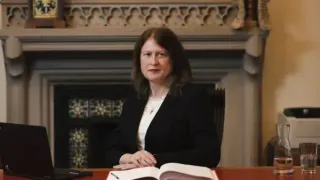
Aug 19
Queer Man Faces Heart-Wrenching Choice: Come Out to Parents or Protect $12 Million Inheritance
READ TIME: 3 MIN.
A recent advice column reported by Queerty has ignited debate across the LGBTQ+ community and beyond, after an anonymous gay man sought guidance about a deeply personal—and financially consequential—dilemma: Whether to come out to his conservative parents and potentially forfeit a $12 million inheritance, or continue to conceal his identity to secure his financial future .
The man, who remains unnamed for privacy reasons, described growing up in a strict, religious household where LGBTQ+ identities were openly condemned. Although now an adult, he continues to hide his sexuality from his parents, aware that their will contains an explicit clause disinheriting any child who is “living a homosexual lifestyle.” The man’s story, as detailed in his letter, resonated with many queer readers who have faced similar ultimatums from their families .
The question, published on August 19, 2025, quickly went viral. The writer, dubbed “Wealth or Truth?,” expressed feeling “trapped between living authentically and securing a future” for himself and his partner of eight years, who is also closeted to his family. He outlined the emotional toll of sustaining the facade, noting mounting stress and the strain it places on his relationship .
Responses from LGBTQ+ advocates and mental health professionals highlight how such predicaments are far from rare. Many LGBTQ+ people, particularly those from conservative or religious backgrounds, face difficult choices between personal safety, family acceptance, and financial well-being. According to the Human Rights Campaign, coming out remains a uniquely fraught process, especially when significant assets or inherited wealth are involved .
Dr. Maya Greene, a clinical psychologist specializing in LGBTQ+ mental health, explained that “the fear of losing financial security can create enormous psychological distress for queer people who are dependent on family wealth or support.” She added that “the cost of the closet isn’t just emotional—it can also shape life opportunities, access to housing, and even retirement planning” .
Advocates for LGBTQ+ financial planning note that these dilemmas underscore the urgency for legal protections and estate planning that do not discriminate based on sexual orientation or gender identity. In the United States, while some states have outlawed inheritance discrimination, families retain broad discretion in distributing private wealth, often leaving queer individuals vulnerable .
The viral story has prompted an outpouring of support and reflection within the LGBTQ+ community. Social media users have shared their own experiences—some recounting being disinherited or cut off after coming out, others expressing gratitude for accepting families. Several LGBTQ+ organizations, including The Trevor Project and PFLAG, used the occasion to emphasize the importance of chosen family and community support for those whose biological families remain unaccepting .
The story also reignited discussion about the long-term effects of conditional acceptance and the trauma of hiding one’s true self for material gain. In interviews with Queerty readers, many expressed that while financial security is important, the psychological burden of remaining closeted often outweighs monetary benefits .
Legal experts note that while it may be possible to challenge discriminatory wills in court, such processes are lengthy, costly, and emotionally draining. Moreover, U.S. law generally honors the wishes of the deceased in the absence of evidence of coercion or incapacity. LGBTQ+ advocacy groups continue to lobby for changes in estate law to protect queer people from such predicaments .
Internationally, the situation varies widely. In some countries, inheritance laws provide greater equality; in others, LGBTQ+ people may face legal and social barriers that make coming out even riskier .
While the man’s ultimate decision remains private, his story has become a touchstone for broader conversations about family, authenticity, and the persistent obstacles faced by LGBTQ+ individuals. Advocacy organizations urge families to prioritize unconditional love and understanding over rigid adherence to outdated beliefs.
As Dr. Greene reflected, “No one should have to choose between their identity and their future. Stories like these remind us that the fight for LGBTQ+ equality is far from over—not just in law, but in hearts and homes” .






